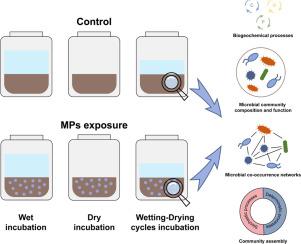当前位置:
X-MOL 学术
›
Water Res.
›
论文详情
Our official English website, www.x-mol.net, welcomes your
feedback! (Note: you will need to create a separate account there.)
Different Wetting States in Riparian Sediment Ecosystems: Response to Microplastics Exposure
Water Research ( IF 11.4 ) Pub Date : 2024-11-20 , DOI: 10.1016/j.watres.2024.122823 Siying He, Yuhang Ye, Yajing Cui, Xiuqin Huo, Maocai Shen, Fang Li, Zhaohui Yang, Guangming Zeng, Weiping Xiong
Water Research ( IF 11.4 ) Pub Date : 2024-11-20 , DOI: 10.1016/j.watres.2024.122823 Siying He, Yuhang Ye, Yajing Cui, Xiuqin Huo, Maocai Shen, Fang Li, Zhaohui Yang, Guangming Zeng, Weiping Xiong

|
Climate change alters the wetting state of riparian sediments, impacting microbial community response and biogeochemical processes. Microplastics (MPs) invade nearly all ecosystems on earth, posing a significant environmental risk. However, little is known about the response mechanism of MP exposure in sediment ecosystems with different wetting states under alternating seasonal rain and drought conditions. In this study, sediments with three different wetting states were selected to explore the differential response of ecosystems to PLA MP exposure. We observed that PLA MP exposure directly affected biogeochemical processes in sediment ecosystems and induced significant changes in microbial communities. PLA MP exposure was found to alter the composition of key species and microbial functional groups in the ecosystem, resulting in a more complex, interconnected, but less stable microbial network. Our findings showed that PLA MP exposure enhances the contribution of stochastic processes, for example the dispersal limitation increasing from 7.41% to 54.32%, indicating that sediment ecosystems strive to buffer disturbances from PLA MP exposure. In addition, 87 pathogenic species were detected in our samples, with PLA MPs acting as vectors for their transmission, potentially amplifying ecosystem disturbance. Importantly, we revealed that submerged sediments may present a greater environmental risk, while alternating wet and dry sediments demonstrate greater resistance and resilience to PLA MPs pollution. Overall, this study sheds light on how sediment ecosystems respond to MP exposure, and highlights differences in sediment response mechanisms across wetting states.
中文翻译:

河岸沉积物生态系统中的不同润湿状态:对微塑料暴露的响应
气候变化改变了河岸沉积物的润湿状态,影响了微生物群落的反应和生物地球化学过程。微塑料 (MP) 几乎侵入地球上的所有生态系统,对环境构成重大风险。然而,在季节雨旱交替条件下,不同湿润状态的沉积物生态系统中MP暴露的响应机制知之甚少。在本研究中,选择了三种不同润湿状态的沉积物,以探索生态系统对 PLA MP 暴露的不同响应。我们观察到 PLA MP 暴露直接影响沉积物生态系统中的生物地球化学过程,并诱导微生物群落发生显着变化。发现 PLA MP 暴露会改变生态系统中关键物种和微生物功能群的组成,导致微生物网络更复杂、相互关联但不太稳定。我们的研究结果表明,PLA MP 暴露增强了随机过程的贡献,例如扩散限制从 7.41% 增加到 54.32%,表明沉积物生态系统努力缓冲 PLA MP 暴露的干扰。此外,在我们的样本中检测到 87 种致病物种,其中 PLA MPS 充当其传播的载体,可能放大生态系统干扰。重要的是,我们揭示了淹没沉积物可能会带来更大的环境风险,而湿沉积物和干沉积物交替表现出对 PLA MPS 污染的更强抵抗力和恢复力。总体而言,本研究阐明了沉积物生态系统如何响应 MP 暴露,并强调了不同润湿状态下沉积物响应机制的差异。
更新日期:2024-11-20
中文翻译:

河岸沉积物生态系统中的不同润湿状态:对微塑料暴露的响应
气候变化改变了河岸沉积物的润湿状态,影响了微生物群落的反应和生物地球化学过程。微塑料 (MP) 几乎侵入地球上的所有生态系统,对环境构成重大风险。然而,在季节雨旱交替条件下,不同湿润状态的沉积物生态系统中MP暴露的响应机制知之甚少。在本研究中,选择了三种不同润湿状态的沉积物,以探索生态系统对 PLA MP 暴露的不同响应。我们观察到 PLA MP 暴露直接影响沉积物生态系统中的生物地球化学过程,并诱导微生物群落发生显着变化。发现 PLA MP 暴露会改变生态系统中关键物种和微生物功能群的组成,导致微生物网络更复杂、相互关联但不太稳定。我们的研究结果表明,PLA MP 暴露增强了随机过程的贡献,例如扩散限制从 7.41% 增加到 54.32%,表明沉积物生态系统努力缓冲 PLA MP 暴露的干扰。此外,在我们的样本中检测到 87 种致病物种,其中 PLA MPS 充当其传播的载体,可能放大生态系统干扰。重要的是,我们揭示了淹没沉积物可能会带来更大的环境风险,而湿沉积物和干沉积物交替表现出对 PLA MPS 污染的更强抵抗力和恢复力。总体而言,本研究阐明了沉积物生态系统如何响应 MP 暴露,并强调了不同润湿状态下沉积物响应机制的差异。


















































 京公网安备 11010802027423号
京公网安备 11010802027423号